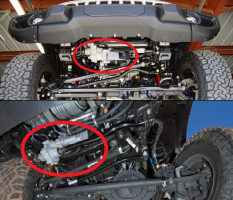
— A Jeep sway bar lawsuit alleges the electronic disconnect fails and forces the owner to drive their Jeep or Ram vehicle on highways and roads without the sway bar, creating dangerous driving conditions.
According to the class action lawsuit, these models are affected by electronic sway bar disconnect problems.
- 2007-2017 Jeep Wrangler Rubicon (JK)
- 2007-2017 Jeep Wrangler Unlimited Rubicon (JKU)
- 2018-2020 Jeep Wrangler Rubicon (JL)
- 2018-2020 Jeep Wrangler Unlimited Rubicon (JLU)
- 2020 Jeep Gladiator Rubicon
- 2005-2010 Dodge Ram 2500 Power Wagon
- 2011-2020 Ram 2500 Power Wagon
A sway bar, also called an anti-roll bar or stabilizer bar, is part of the suspension and helps to keep the truck or SUV level, especially when the vehicle leans on turns. The sway bar applies upward force on one side while applying downward force on the other side, helping to keep the vehicle level.
A sway bar isn't much good when the Jeep or Ram is used off-road, but during routine driving on roads and highways the sway bars are important safety features.
Temporarily disconnecting the sway bar when off-roading or driving on rough terrain allows greater suspension “articulation,” meaning how far up and down the axle can move relative to the chassis.
According to the sway bar lawsuit, increasing "articulation allows the vehicle to keep all four tires in contact with the ground on rough terrain, which in turn provides better stability and traction."
Because articulation is one of the most important factors in determining if the Jeep or Ram can get over an obstacle, off-road drivers typically choose to disconnect the sway bars.
The plaintiffs who sued say Fiat Chrysler (FCA US) markets electronic sway bar disconnect switches on the Jeeps and Rams, giving drivers the ability to connect or disconnect the sway bars simply by flipping dash-mounted switches.
“Electronic Sway Bar Disconnect system allows you to remotely disconnect your sway bar from the cabin, so front wheels can drop and compress for better suspension and articulation on tough terrain.” - Jeep website
However, the class action alleges the electronic sway bar disconnect is defective because an electronic circuit board for the sway bar disconnect is in a housing with seals that are prone to failure. In addition, the circuit board is allegedly located in an area that gets wet when driving in rain or over puddles.
Water or contaminants enter through the housing seals and causes malfunctions of the electronic sway bar disconnect, causing failure of the sway bar to reconnect.
The plaintiffs claim Chrysler has known about the alleged sway bar problems since 2005 but refuses to do anything to repair the sway bar disconnect defects.
Alleging the design of the electronic sway bar disconnect is "stunningly bad," the lawsuit says Jeep and Ram customers are stuck driving vehicles with electronic actuator mechanisms and circuit boards located in housings with defective seals that fail.
The lawsuit says the actuator part number for all the Jeeps is 68044411AC. And there are three actuator part numbers for the Ram trucks: 68044415AA (2005 Power Wagon), 6804412AA (2006-2012 Power Wagon), 68217400AA (2013 and later Power Wagons).
But allegedly making things even worse, there is limited circuit board electrical insulation in proximity to the metal housing, making the components easy targets for liquids. Additionally, FCA allegedly tells customers the Jeeps and Rams have a water fording depth of 30 inches.
"At that depth, the actuator for the electronic sway bar disconnect would be, at least partially if not fully, submerged for both a Jeep and Power Wagon. Thus, even though the vehicles are advertised to be able to drive through water that partially, if not fully, submerges the sway bar actuator housing, the housings still fail in conditions much less extreme, such as those found on normal wet roads." - Sway bar lawsuit
According to the plaintiffs, Jeep and Ram owners say sway bar disconnect malfunctions can cause the dashboard sway bar indicator light and/or the sway bar fault warning light to flash on and off erratically.
The class action lawsuit argues Chrysler should establish a program to repair the sway bar problems or buy back the Jeep SUVs and Ram trucks.
The Jeep sway bar lawsuit was filed in the U.S. District Court for the Eastern District of Michigan: Flores, et al., v. FCA US LLC.
The plaintiffs are represented by Bursor & Fisher, P.A., and Barbat, Mansour, Suciu & Tomina, PLLC.




